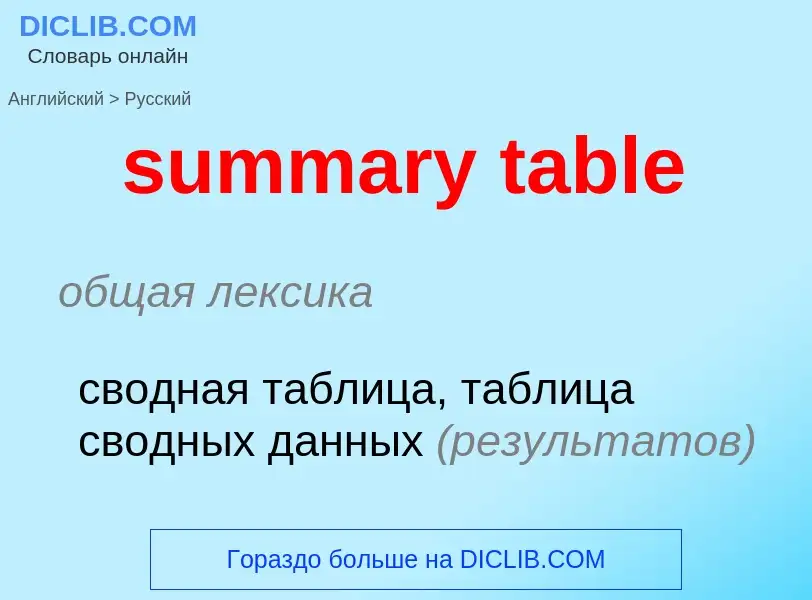Μετάφραση και ανάλυση λέξεων από την τεχνητή νοημοσύνη ChatGPT
Σε αυτήν τη σελίδα μπορείτε να λάβετε μια λεπτομερή ανάλυση μιας λέξης ή μιας φράσης, η οποία δημιουργήθηκε χρησιμοποιώντας το ChatGPT, την καλύτερη τεχνολογία τεχνητής νοημοσύνης μέχρι σήμερα:
- πώς χρησιμοποιείται η λέξη
- συχνότητα χρήσης
- χρησιμοποιείται πιο συχνά στον προφορικό ή γραπτό λόγο
- επιλογές μετάφρασης λέξεων
- παραδείγματα χρήσης (πολλές φράσεις με μετάφραση)
- ετυμολογία
summary table - translation to ρωσικά
общая лексика
сводная таблица, таблица сводных данных (результатов)
сводная таблица
Ορισμός
Βικιπαίδεια
In law, a summary judgment (also judgment as a matter of law or summary disposition) is a judgment entered by a court for one party and against another party summarily, i.e., without a full trial. Summary judgments may be issued on the merits of an entire case, or on discrete issues in that case. The formulation of the summary judgment standard is stated in somewhat different ways by courts in different jurisdictions. In the United States, the presiding judge generally must find there is "no genuine dispute as to any material fact and the movant is entitled to judgment as a matter of law." In England and Wales, the court rules for a party without a full trial when "the claim, defence or issue has no real prospect of success and there is no other compelling reason why the case or issue should be disposed of at a trial."
In common-law systems, questions about what the law actually is in a particular case are decided by judges; in rare cases jury nullification of the law may act to contravene or complement the instructions or orders of the judge, or other officers of the court. A factfinder has to decide what the facts are and apply the law. In traditional common law the factfinder was a jury, but in many jurisdictions the judge now acts as the factfinder as well. It is the factfinder who decides "what really happened", and it is the judge who applies the law to the facts as determined by the factfinder, whether directly or by giving instructions to the jury.
In the absence of an award of summary judgment (or some type of pretrial dismissal), a lawsuit ordinarily proceeds to trial, which is an opportunity for litigants to present evidence in an attempt to persuade the factfinder that they are saying "what really happened", and that, under the applicable law, they should prevail.
The necessary steps before a case can get to trial include disclosing documents to the opponent by discovery, showing the other side the evidence, often in the form of witness statements. This process is lengthy, and can be difficult and costly.
A party moving (applying) for summary judgment is attempting to avoid the time and expense of a trial when, in the moving party's view, the outcome is obvious. Typically this is stated as, when all the evidence likely to be put forward is such that no reasonable factfinder could disagree with the moving party, summary judgment is appropriate. Sometimes this will occur when there is no real dispute as to what happened, but it also frequently occurs when there is a nominal dispute but the non-moving party cannot produce enough evidence to support its position. A party may also move for summary judgment in order to eliminate the risk of losing at trial, and possibly avoid having to go through discovery (i.e., by moving at the outset of discovery), by demonstrating to the judge, via sworn statements and documentary evidence, that there are no material factual issues remaining to be tried. If there is nothing for the factfinder to decide, then the moving party asks rhetorically, why have a trial? The moving party will also attempt to persuade the court that the undisputed material facts require judgment to be entered in its favor. In many jurisdictions, a party moving for summary judgment takes the risk that, although the judge may agree there are no material issues of fact remaining for trial, the judge may also find that it is the non-moving party that is entitled to judgment as a matter of law.


